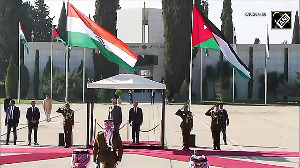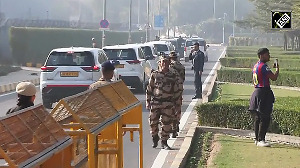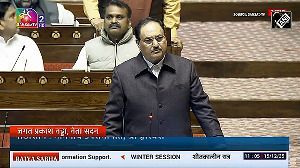A Pakistan-based conglomerate of militant groups active in Kashmir, headed by Syed Salahuddin, has temporarily dissolved itself with its leaders going underground in the wake of the crackdown on Jamaat-ud-Dawa and other banned terrorist outfits, a media report said on Saturday.
The United Jehad Council -- which comprises Hizbul Mujahideen of Salahuddin, Harkat-ul-Ansar, Jamiat-ul- Mujahideen, Al-Jihad, Al-Barq, Ikhwan-ul-Mussalmin and Tehrik-ul-Mujahideen -- has closed its offices, removed all signboards and asked its leaders to stay quiet while temporarily dissolving the coalition, the report said.
"Following the Mumbai attacks and the subsequent tension between Pakistan and India, the United Jihad Council has decided to remain silent," an unnamed commander of one of the militant groups in the UJC told The News daily.
He said the current Pakistani leadership is pursuing the policy adopted by ex-President Pervez Musharraf and "statements on Kashmir issued so far by President Asif Zardari'.
"In the current situation, the UJC is maintaining complete silence and has no contact with any Pakistani organisation or institution," he said and claimed that groups banned in Pakistan, including the Lashker-e-Toiba blamed for the Mumbai attacks, had "never worked with the UJC, nor maintained with it any direct or indirect contact".
However, the militant commander threatened to continue their activities.
Pakistan government has launched a crackdown on leaders of Lashkar-e-Taba and arrested several militants, including Zakiur Rehman Lakhvi, the alleged mastermind of the Mumbai attacks, after the UN Security Council declared JuD, the front organisation of LeT, a terrorist group.
Since the government started sealing JuD offices across Pakistan and Pakistan-occupied Kashmir, all central leaders of the UJC have been maintaining a low profile. The UJC has "removed signboards from temporary sub-offices of (its member) organisations in various districts" of Pakistan occupied Kashmir, The News reported.
When the newspaper contacted Foreign Office spokesman Mohammad Sadiq, he said there was no change in Pakistan's Kashmir policy. However, he insisted that no authority in Pakistan had any links with militant groups operating in Kashmir.
The UJC was formed in the summer of 1994. By 1999, as many as 15 militant groups were affiliated to the UJC, though only about five of them are now considered influential.





